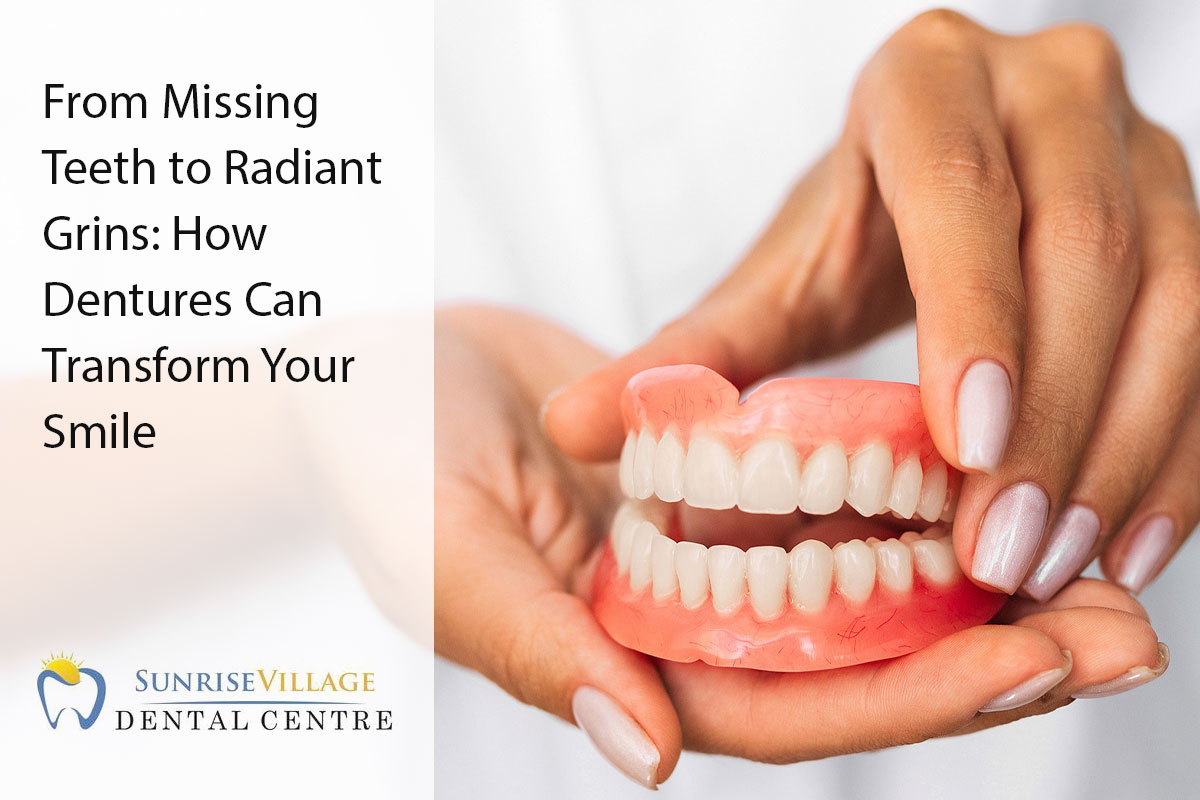
Types of Dentures
Dentures come in different types, each serving various needs based on how many teeth you’ve lost. Here are the main options:
- Complete Dentures: For folks with no natural teeth left, complete dentures replace all your teeth. They’re custom-made for your mouth, held in place with suction or dental adhesives, and are removable.
- Partial Dentures: If you have some of your natural teeth left, partial dentures can fill the gaps. They consist of replacement teeth on a gum-coloured base and use metal clasps to attach to your remaining teeth.
- Implant-Supported Dentures: These are a more advanced option and provide excellent stability and comfort. They attach to dental implants surgically placed in your jawbone, offering the closest thing to natural teeth.
Benefits of Dentures
Dentures offer many benefits beyond just replacing missing teeth. Let’s see how they can improve your life:
- Look Better: Dentures help your face look more youthful by giving support to your cheeks and lips, reducing sagging and sunken-in appearance. This boosts your self-confidence and makes your smile more appealing.
- Speak Clearly: Missing teeth can affect how you speak. Dentures restore your teeth’s shape and alignment, allowing you to speak clearly and confidently without worrying about slurred speech or lisps.
- Eat Better: Missing teeth can make chewing hard, limiting your diet and affecting your health. Dentures let you chew properly, enjoy a wider range of foods, and ensure good digestion. You can relish your favourite meals and stay healthy.
- Feel Confident: Missing teeth can hurt your self-esteem, making you shy and hesitant to smile. Dentures give you a beautiful, natural-looking smile, boosting your confidence and making social interactions more comfortable and enjoyable.
- Healthier Mouth: Gaps from missing teeth can cause neighbouring teeth to shift, leading to bite problems, jaw pain, and higher risks of tooth decay and gum disease. Dentures fill these gaps, preventing these issues and making it easier to maintain good oral hygiene through brushing and flossing.
The Denture Fitting Process
Getting dentures involves a series of steps to make sure they fit well and look natural. Here’s how it works:
- First Meeting: Your dentist checks your oral health, takes mouth impressions, and discusses your preferences. This helps decide the best denture type for you.
- Tooth Removal (if needed): If any natural teeth need to be removed before dentures, your dentist schedules that separately to prepare your mouth.
- Measuring and Molding: After your mouth is ready, the dentist makes detailed measurements and molds of your gums, jaw, and any remaining teeth. These guide the creation of custom dentures that fit perfectly.
- Trying Them On: A trial denture is made based on your measurements. Your dentist checks how it fits, looks, and feels. Adjustments are made to ensure a good fit and comfort.
- Final Fitting: Once the trial denture is right, the final denture is created to match your existing teeth in shape, colour, and size. Your dentist ensures it fits comfortably and securely.
- Aftercare: Your dentist gives you instructions for denture care, including cleaning and soaking to keep them clean and in good shape. You’ll have regular check-ups to make sure your dentures still fit well.
Caring for Dentures
To take care of your dentures and keep them working well:
- Rinse After Eating: After meals, remove your dentures and rinse them under running water to get rid of food particles and bacteria, which can cause staining.
- Gently Brush: Use a soft toothbrush or a special denture brush to clean your dentures every day. Avoid regular toothpaste, as it can be too rough and harm them. Instead, use a gentle denture cleaner or one recommended by your dentist.
- Soak Overnight: To maintain their moisture and prevent warping, soak your dentures in a denture cleaning solution or plain water overnight. Follow the instructions on the cleaning solution’s label.
- Be Careful: When handling your dentures, be gentle to prevent bending or breaking. Hold them over a soft towel or a basin filled with water just in case they slip from your hands.
- Keep Up Oral Hygiene: Maintaining oral hygiene remains vital with dentures. Use a soft toothbrush to brush your gums, tongue, and any remaining natural teeth, ensuring plaque removal and preventing gum problems.
- Visit Your Dentist: Regularly set up dentist appointments to confirm your dentures’ fit and condition. Your dentist will also inspect your gums and mouth for signs of irritation or infection during these check-ups.
By following these care steps and maintaining good oral hygiene, you can make your dentures last longer and work better.
